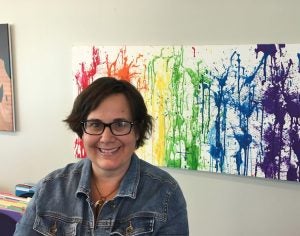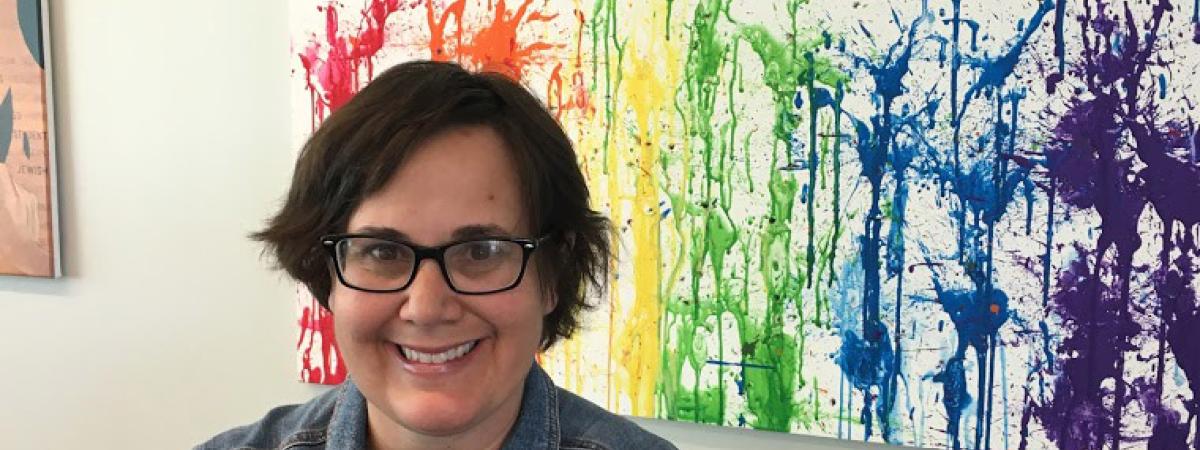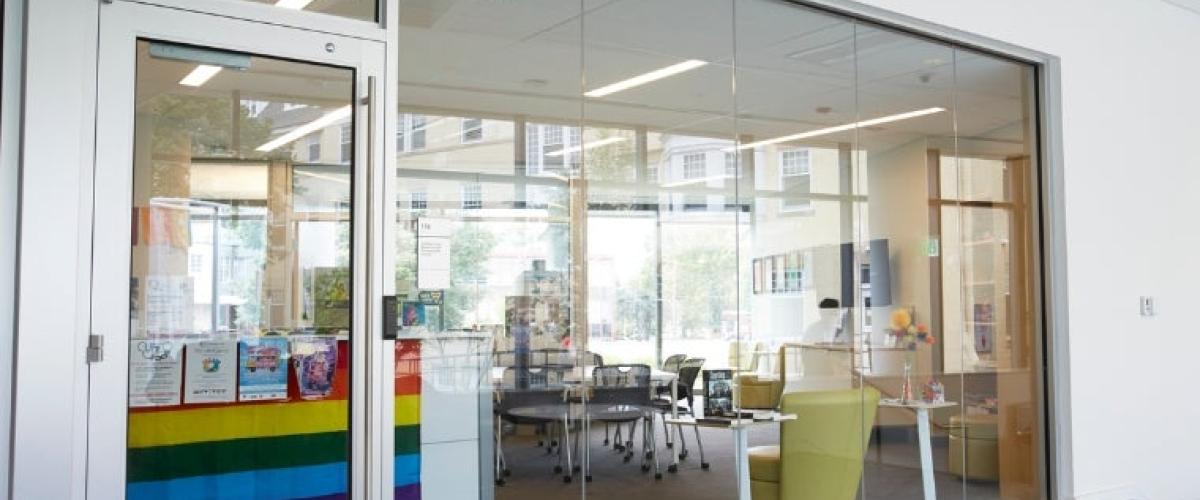 Liz Roccoforte remembers being a sensitive kid.
“I was easily upset by seeing others in pain, so much so that I was sometimes teased for being ‘oversensitive,’” she said.
This sensitivity, however, remains at the core of her work.
“I have a personal stake in the LGBTQ community,” said Roccoforte, who identifies as queer, “but the LGBTQ community is diverse and vast. Even though I don’t share the exact same identity with everyone who shares the acronym, I hope my sensitivity to their experiences will assist me in supporting them and advocating for change.”
As director and the only full-time employee at the university’s LGBT Center, she’s been the driving force behind LGBTQ (lesbian, gay, bisexual, transgender and queer or questioning) acceptance and understanding at CWRU.
Roccoforte was key in raising CWRU’s rating on the Campus Pride Index this year, from four out of five stars to 4.5. The rating is a premier indication of how the university is doing in matters of inclusiveness and LGBTQ policies, programs and practices.
This new 4.5 rating comes just a year after CWRU dropped from a five rating to a four—but the initial drop came amid changes to the index to make it an overall better reflection of inclusive policies and practices.
Throughout the LGBT Center’s six-year history, Roccoforte has been a dedicated figure in not only building the center up, but also cultivating an improved campus culture for LGBTQ people.
While she was not involved in laying the groundwork for the center—a committee worked for years to establish an LGBT center at CWRU before its fruition in 2010—Roccoforte split time between the Office for Inclusion, Diversity and Equal Opportunity and the center in 2010, and soon took on the role of director full time.
In her time with the center, a key initiative she’s helped to develop and implement is Safe Zone training to create a visible network of individuals dedicated to being allies for LGBT people. Since the program was initially instituted at CWRU (before the LGBT Center even opened), more than 1,200 people have completed the workshops.
“While Safe Zone has never been a mandatory training, it eventually became something people genuinely wanted to do. That’s when you know you have a pretty successful program. When sororities and fraternities and STEM-based academic faculty are calling us and saying, ‘We want Safe Zone for our people,’ you hope its an indication of a sincere culture shift on campus.”
A revamped version of the program will launch this fall to provide the most up-to-date information to those who opt to participate.
While Roccoforte is always looking to improve the center and overall campus environment—ratings or not—the Campus Pride Index gives her and her team of student workers and part-time department coordinator AmariYah Israel something to work for and build upon, spelling out the areas that could use the most development and providing information about best practices.
Chief among the reasons for the improved rating was the creation of the LGBTQ Research Group and Diversity 360, which provided more academic backing and awareness, respectively.
The LGBTQ Research Group brings together faculty, staff and grad students interested in pursuing research projects or initiatives related to LGBTQ studies. Meanwhile, Diversity 360 is a campuswide diversity education program to increase inclusiveness at CWRU.
Roccoforte recognizes that not every LGBTQ student at Case Western Reserve University has a 4.5 experience. Instead, she said, some might have a zero—and it’s exactly those students who she’s working for.
But in general, she believes the rating is reflective of the support and sense of community LGBTQ students feel at CWRU—which is something she aims to maintain and improve upon.
Roccoforte has been busy this week leading programming for first-year students. But she took the time to sit down with us to answer our five questions. Check out her answers below.
Liz Roccoforte remembers being a sensitive kid.
“I was easily upset by seeing others in pain, so much so that I was sometimes teased for being ‘oversensitive,’” she said.
This sensitivity, however, remains at the core of her work.
“I have a personal stake in the LGBTQ community,” said Roccoforte, who identifies as queer, “but the LGBTQ community is diverse and vast. Even though I don’t share the exact same identity with everyone who shares the acronym, I hope my sensitivity to their experiences will assist me in supporting them and advocating for change.”
As director and the only full-time employee at the university’s LGBT Center, she’s been the driving force behind LGBTQ (lesbian, gay, bisexual, transgender and queer or questioning) acceptance and understanding at CWRU.
Roccoforte was key in raising CWRU’s rating on the Campus Pride Index this year, from four out of five stars to 4.5. The rating is a premier indication of how the university is doing in matters of inclusiveness and LGBTQ policies, programs and practices.
This new 4.5 rating comes just a year after CWRU dropped from a five rating to a four—but the initial drop came amid changes to the index to make it an overall better reflection of inclusive policies and practices.
Throughout the LGBT Center’s six-year history, Roccoforte has been a dedicated figure in not only building the center up, but also cultivating an improved campus culture for LGBTQ people.
While she was not involved in laying the groundwork for the center—a committee worked for years to establish an LGBT center at CWRU before its fruition in 2010—Roccoforte split time between the Office for Inclusion, Diversity and Equal Opportunity and the center in 2010, and soon took on the role of director full time.
In her time with the center, a key initiative she’s helped to develop and implement is Safe Zone training to create a visible network of individuals dedicated to being allies for LGBT people. Since the program was initially instituted at CWRU (before the LGBT Center even opened), more than 1,200 people have completed the workshops.
“While Safe Zone has never been a mandatory training, it eventually became something people genuinely wanted to do. That’s when you know you have a pretty successful program. When sororities and fraternities and STEM-based academic faculty are calling us and saying, ‘We want Safe Zone for our people,’ you hope its an indication of a sincere culture shift on campus.”
A revamped version of the program will launch this fall to provide the most up-to-date information to those who opt to participate.
While Roccoforte is always looking to improve the center and overall campus environment—ratings or not—the Campus Pride Index gives her and her team of student workers and part-time department coordinator AmariYah Israel something to work for and build upon, spelling out the areas that could use the most development and providing information about best practices.
Chief among the reasons for the improved rating was the creation of the LGBTQ Research Group and Diversity 360, which provided more academic backing and awareness, respectively.
The LGBTQ Research Group brings together faculty, staff and grad students interested in pursuing research projects or initiatives related to LGBTQ studies. Meanwhile, Diversity 360 is a campuswide diversity education program to increase inclusiveness at CWRU.
Roccoforte recognizes that not every LGBTQ student at Case Western Reserve University has a 4.5 experience. Instead, she said, some might have a zero—and it’s exactly those students who she’s working for.
But in general, she believes the rating is reflective of the support and sense of community LGBTQ students feel at CWRU—which is something she aims to maintain and improve upon.
Roccoforte has been busy this week leading programming for first-year students. But she took the time to sit down with us to answer our five questions. Check out her answers below.

5 questions with… LGBT Center Director Liz Roccoforte
 Liz Roccoforte remembers being a sensitive kid.
“I was easily upset by seeing others in pain, so much so that I was sometimes teased for being ‘oversensitive,’” she said.
This sensitivity, however, remains at the core of her work.
“I have a personal stake in the LGBTQ community,” said Roccoforte, who identifies as queer, “but the LGBTQ community is diverse and vast. Even though I don’t share the exact same identity with everyone who shares the acronym, I hope my sensitivity to their experiences will assist me in supporting them and advocating for change.”
As director and the only full-time employee at the university’s LGBT Center, she’s been the driving force behind LGBTQ (lesbian, gay, bisexual, transgender and queer or questioning) acceptance and understanding at CWRU.
Roccoforte was key in raising CWRU’s rating on the Campus Pride Index this year, from four out of five stars to 4.5. The rating is a premier indication of how the university is doing in matters of inclusiveness and LGBTQ policies, programs and practices.
This new 4.5 rating comes just a year after CWRU dropped from a five rating to a four—but the initial drop came amid changes to the index to make it an overall better reflection of inclusive policies and practices.
Throughout the LGBT Center’s six-year history, Roccoforte has been a dedicated figure in not only building the center up, but also cultivating an improved campus culture for LGBTQ people.
While she was not involved in laying the groundwork for the center—a committee worked for years to establish an LGBT center at CWRU before its fruition in 2010—Roccoforte split time between the Office for Inclusion, Diversity and Equal Opportunity and the center in 2010, and soon took on the role of director full time.
In her time with the center, a key initiative she’s helped to develop and implement is Safe Zone training to create a visible network of individuals dedicated to being allies for LGBT people. Since the program was initially instituted at CWRU (before the LGBT Center even opened), more than 1,200 people have completed the workshops.
“While Safe Zone has never been a mandatory training, it eventually became something people genuinely wanted to do. That’s when you know you have a pretty successful program. When sororities and fraternities and STEM-based academic faculty are calling us and saying, ‘We want Safe Zone for our people,’ you hope its an indication of a sincere culture shift on campus.”
A revamped version of the program will launch this fall to provide the most up-to-date information to those who opt to participate.
While Roccoforte is always looking to improve the center and overall campus environment—ratings or not—the Campus Pride Index gives her and her team of student workers and part-time department coordinator AmariYah Israel something to work for and build upon, spelling out the areas that could use the most development and providing information about best practices.
Chief among the reasons for the improved rating was the creation of the LGBTQ Research Group and Diversity 360, which provided more academic backing and awareness, respectively.
The LGBTQ Research Group brings together faculty, staff and grad students interested in pursuing research projects or initiatives related to LGBTQ studies. Meanwhile, Diversity 360 is a campuswide diversity education program to increase inclusiveness at CWRU.
Roccoforte recognizes that not every LGBTQ student at Case Western Reserve University has a 4.5 experience. Instead, she said, some might have a zero—and it’s exactly those students who she’s working for.
But in general, she believes the rating is reflective of the support and sense of community LGBTQ students feel at CWRU—which is something she aims to maintain and improve upon.
Roccoforte has been busy this week leading programming for first-year students. But she took the time to sit down with us to answer our five questions. Check out her answers below.
Liz Roccoforte remembers being a sensitive kid.
“I was easily upset by seeing others in pain, so much so that I was sometimes teased for being ‘oversensitive,’” she said.
This sensitivity, however, remains at the core of her work.
“I have a personal stake in the LGBTQ community,” said Roccoforte, who identifies as queer, “but the LGBTQ community is diverse and vast. Even though I don’t share the exact same identity with everyone who shares the acronym, I hope my sensitivity to their experiences will assist me in supporting them and advocating for change.”
As director and the only full-time employee at the university’s LGBT Center, she’s been the driving force behind LGBTQ (lesbian, gay, bisexual, transgender and queer or questioning) acceptance and understanding at CWRU.
Roccoforte was key in raising CWRU’s rating on the Campus Pride Index this year, from four out of five stars to 4.5. The rating is a premier indication of how the university is doing in matters of inclusiveness and LGBTQ policies, programs and practices.
This new 4.5 rating comes just a year after CWRU dropped from a five rating to a four—but the initial drop came amid changes to the index to make it an overall better reflection of inclusive policies and practices.
Throughout the LGBT Center’s six-year history, Roccoforte has been a dedicated figure in not only building the center up, but also cultivating an improved campus culture for LGBTQ people.
While she was not involved in laying the groundwork for the center—a committee worked for years to establish an LGBT center at CWRU before its fruition in 2010—Roccoforte split time between the Office for Inclusion, Diversity and Equal Opportunity and the center in 2010, and soon took on the role of director full time.
In her time with the center, a key initiative she’s helped to develop and implement is Safe Zone training to create a visible network of individuals dedicated to being allies for LGBT people. Since the program was initially instituted at CWRU (before the LGBT Center even opened), more than 1,200 people have completed the workshops.
“While Safe Zone has never been a mandatory training, it eventually became something people genuinely wanted to do. That’s when you know you have a pretty successful program. When sororities and fraternities and STEM-based academic faculty are calling us and saying, ‘We want Safe Zone for our people,’ you hope its an indication of a sincere culture shift on campus.”
A revamped version of the program will launch this fall to provide the most up-to-date information to those who opt to participate.
While Roccoforte is always looking to improve the center and overall campus environment—ratings or not—the Campus Pride Index gives her and her team of student workers and part-time department coordinator AmariYah Israel something to work for and build upon, spelling out the areas that could use the most development and providing information about best practices.
Chief among the reasons for the improved rating was the creation of the LGBTQ Research Group and Diversity 360, which provided more academic backing and awareness, respectively.
The LGBTQ Research Group brings together faculty, staff and grad students interested in pursuing research projects or initiatives related to LGBTQ studies. Meanwhile, Diversity 360 is a campuswide diversity education program to increase inclusiveness at CWRU.
Roccoforte recognizes that not every LGBTQ student at Case Western Reserve University has a 4.5 experience. Instead, she said, some might have a zero—and it’s exactly those students who she’s working for.
But in general, she believes the rating is reflective of the support and sense of community LGBTQ students feel at CWRU—which is something she aims to maintain and improve upon.
Roccoforte has been busy this week leading programming for first-year students. But she took the time to sit down with us to answer our five questions. Check out her answers below.



